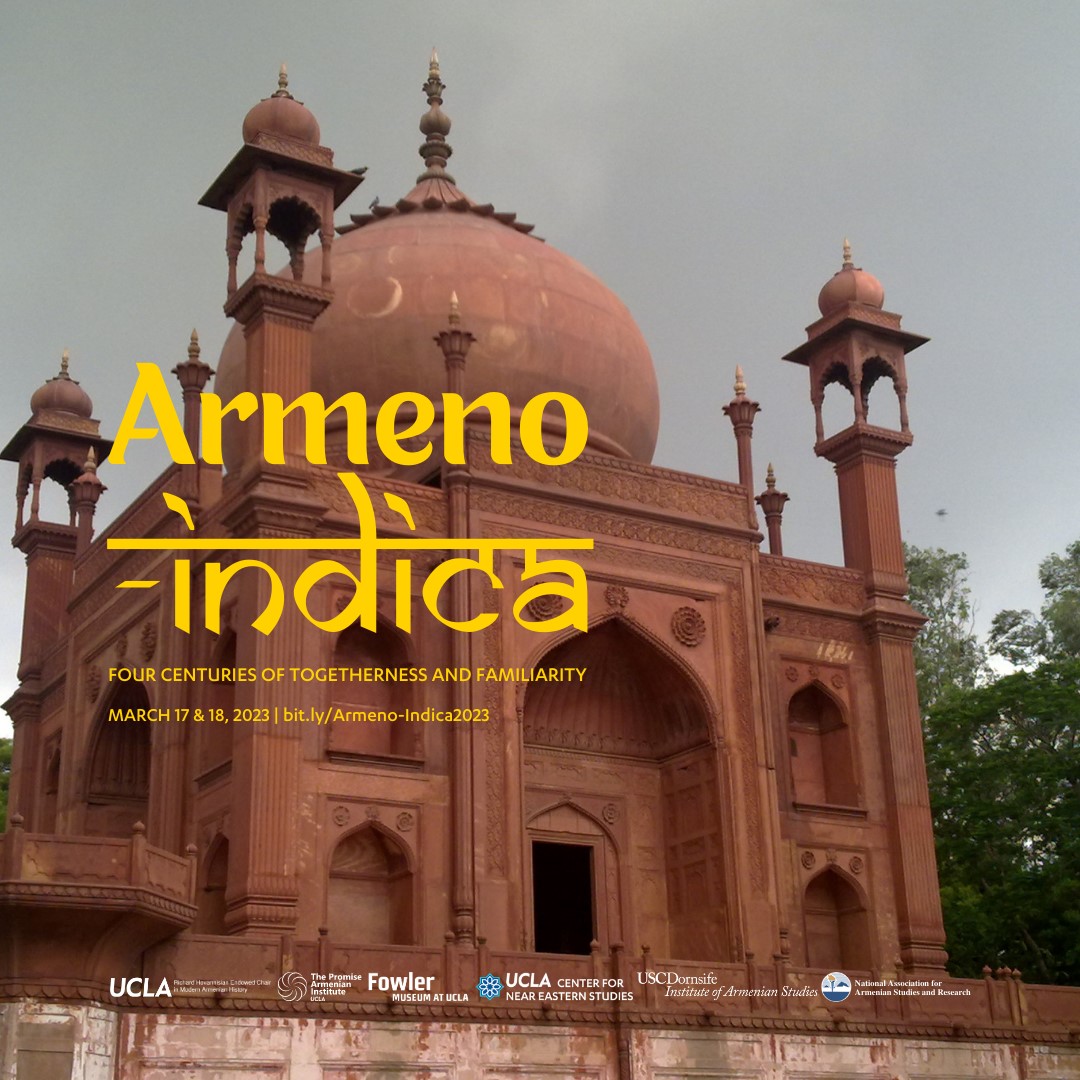
Armeno-Indica: Four Centuries of Familiarity and Friendship
March 17 – March 18
This event is organized by the UCLA Richard Hovannisian Endowed Chair in Modern Armenian History.
Friday, March 17, 2023, | 10:00 AM – 6:30 PM (Pacific Time)
to
Saturday, March 18, 2023, | 11:30 AM – 6:00 PM (Pacific Time)
Postponed due to the pandemic, this international conference celebrates the bicentenary of the founding of Kolkata’s famed Armenian College (est. 1821), one of three centers of Armenian higher learning in the diaspora during the nineteenth century and the only one that has survived and is thriving today. Bringing together economic, literary, legal, and cultural historians from India, Armenia, France, the United Kingdom, Germany, and the United States, the conference highlights how, beginning in the early modern period and continuing to the present, Armenians have traveled to India to make its distant shores and cultures their own. India looms large in the Armenian social imaginary. It was not only the place where the first Armenian proto-constitution for an “imagined” nation-republic was published (Madras 1788/9), it was also the cradle of the first Armenian newspaper (Madras, 1794-1796), the first modern Armenian play (Calcutta 1823), and arguably also where the first Eastern Armenian novel appeared (Calcutta, 1846), as well as where the first Armenian “feminist” tract (Calcutta, 1847) was published.
Gathering an international group of scholars, Armeno-Indica explores the Indo-Armenian saga in South Asia from the seventeenth to the twenty-first centuries. The themes to be explored include the connected economic, literary, legal, and political histories of Armenians and Indians in South Asia and beyond across the waters of the Indian Ocean. The keynote for the conference will be delivered by Professor Sanjay Subrahmanyam.
Please fill out the form for providing RSVP for in-person attendance. The form is located at the following hyperlink: https://sscucla.qualtrics.com/jfe/form/SV_bgcerNdYzuQgRHU
VENUE: UCLA Royce Hall 314 and Fowler Museum
Alternatively, you may attend this conference using zoom with prior. Here is the hyperlink that will lead you to the form that needs to be filled out: http://bit.ly/armenoindica-virtual
Friday, March 17, 2023 (Royce 314, UCLA)
Welcoming words: Amy Landau and Ann Karagozian
(10:00 AM – 10:15 AM)
Introduction to the conference: Sebouh David Aslanian
(10:15 AM – 10:30 AM)
Panel 1: Trade, Law, and Go-Betweens (10:30 AM – 12:30 PM)
Santanu Sengupta (Kolkata): “Negotiating with Law: Phases of Armenian Interaction with the Early Colonial Law Courts in India.”
Xabier Lamikiz (University of the Basque Country /Euskal Herriko Unibertsitatea (UPV/EHU): “Armenian Merchants from Madras in Eighteenth-Century Spanish Manila: A Story of Love and Hate.”
Ruquia Hussain (Aligarh Muslim University, AMU): “Of Sarhad and Calcutta: The English East India Company, Khwāja Israel di Sarhad and the Foundation of Modern Calcutta.”
Sona Tajiryan (Gemological Institute of America, GIA): “How to Choose and Buy Pearls? An Eighteenth-Century Armenian Guide on the Pearl Trade in India (1730s).”
Discussant: Glenn Penny (UCLA)
Lunch Break: Balcony of Royce 306 (12:30 PM – 1:30 PM)
Panel 2: Language and Literary Revival (1:30 PM-3:00 PM)
Ahona Panda (Claremont McKenna): “Ajab Shahar Calcutta: The Outsider in the Bengal Renaissance.”
Talar Chahinian (University of California, Irvine): “Mobilizing Subjectivity in the Practice of the Nation: Tagheadeants‘s’ Case for Women’s Education.”
Peter Cowe (Near Eastern Languages and Cultures, UCLA): “Intertextuality and Innovation: Mesrop Taghiadeants‘ and his Experimentation with the Novel Genre in Comparative Perspective.”
Discussant: Houri Berberian (University of California, Irvine)
Coffee Break: (3:00 PM – 3:15 PM)
Panel 3: Armenian Historiography and Print Culture in Madras (3:15-5:00PM)
Martin Adamian (UCLA, graduate student): “Mesrovb J. Seth, Father of Indo-Armenian Historiography.”
Anna Sirinian (Dipartimento di Storia Culture Civiltà, Università di Bologna): “Azdarar (1794-1796): The First Armenian Periodical in the World.”
Hasmik Kirakosyan (Senior Researcher, Mashtots Repository of Manuscripts, Yerevan): “Harutiwn Shmavonean an Armenian Printer-publisher in Madras and a Farman for Printing in Arabic script in Madras.”
Discussant: Nile Green (UCLA)
Panel 4: History in the Present (5:00 PM – 6:30 PM)
Armen Arslanian: (Warden of the Armenian Church of Dhaka, Bangladesh): “The Armenian Church of Dhaka (Bangladesh) and the task of Heritage preservation.”
Vache Tadevosyan: (Community leader, Kolkata, India): “The Mardasirakan Jemaran (Armenian College of Kolkata) and its Bicentenary.”
Satenik Chookaszian (Armenian National Gallery in Yerevan): “Sargis Katchadourian’s reproductions of India’s cultural gems from the collection of National Gallery of Armenia.”
Chair and Discussant: Armen Baibourtian
Saturday, March 18, 2023 (Fowler Museum, UCLA)
Check-in at Lenart Hall (11:30 AM – 12:00 PM)
Welcoming remarks: Amy Landau
Panel 1: Monuments, Patronage, and Indo-Persianate Identities (12:00 PM – 2:00 PM)
Sebouh David Aslanian (Department of History, UCLA): “Cemeteries as Heterotopias: Armenian Sepulchral Culture in Agra and Surat, or what the Dead can tell us About the Living.”
Talinn Grigor (Department of Art History, UC Davis): “‘Transimperial’ Strategies of Artistic Patronage: From New Julfan Merchants to Parsi Industrialists.”
Veronika Zablotsky (Freie Universität, Berlin): “Orientalism and the Making of the Armenian Diasporic Imaginary in Early Colonial India.”
Discussant: Peter Cowe (UCLA)
Panel 2: The Historical Imagination and the Circulation of Revolutionary Ideas in Late 18th Century South India (2:00 PM – 3:30PM)
Michael O’Sullivan (The European University Institute, Florence): “Portfolio Capitalism and History-Writing in Hagop Simonean Ayubeant’s Life of Haydar Ali Khan, c. 1782-1795.”
Ayal Amer (UC Irvine): “Fitna and Patriotism in Late 18th century Madras.”
Satenig Badwagan Toufanian (Inalco, Paris): “The Snare of Glory: A Call for Freedom from Madras.”
Discussant: Sebouh D. Aslanian
Intermission: Lemonade, Cookies, and Open Galleries in Courtyard (3:30 PM – 4:40 PM)
Keynote Address (4:40 PM – 5:40 PM)
Sanjay Subrahmanyam (Distinguished Professor & Irving and Jean Stone Endowed Chair in Social Sciences): “Armenians and Others in Mughal Surat: Rethinking Communities, Collaboration and Conflict.”
Reception on the Terrace (6:00m – 7:30 pm)
ORGANIZERS
- UCLA Richard Hovannisian Chair of Modern Armenian History
- Fowler Museum at UCLA
- Armenian Studies Center at the UCLA Promise Armenian Institute
- USC Dornsife Institute of Armenian Studies
- National Association for Armenian Studies and Research (NAASR)
- UCLA Narekatsi Chair in Armenian Studies
- UCLA Center for Near Eastern Studies